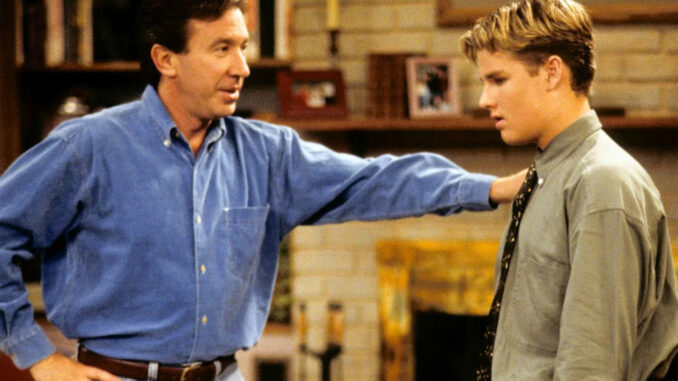
The familiar thrum of a power tool, the iconic grunts, and the affable, if slightly accident-prone, wisdom of Tim "The Tool Man" Taylor are etched into the collective memory of a generation. Home Improvement, with its wholesome family dynamics, neighborhood banter, and a steady stream of "more power," was a comfort blanket for the 90s, a sun-drenched tableau of suburban Americana. At its heart was Tim Allen, the charismatic patriarch both on and off-screen, steering a ship that seemed perpetually destined for laughter and heartwarming lessons.
Then, the static began. Not the cheerful static of a TV left on too long, but the unsettling crackle of real-world distress breaking through the meticulously crafted illusion of the sitcom. When news emerged of a Home Improvement child star entangled in serious legal troubles, it sent a ripple of disquiet through the nostalgic glow. It was a jarring dissonance, like hearing a mournful, off-key note in a beloved, familiar melody. And then, Tim Allen spoke.
His words, carefully weighed and delivered with a discernible weariness, weren't a tirade or a judgment. They were, instead, a lament. They were the sound of a once-paternal figure grappling with the shattered innocence of a past shared, a public image fractured, and the stark reality of life beyond the laugh track. When Allen, the man who once dispensed televised advice on everything from fixing a leaky faucet to handling teenage angst, addressed the struggles of his former on-screen son, it was more than a celebrity comment; it was a poignant illustration of several profound truths.
Firstly, it was an illustration of the fragility of the fabricated perfect. For years, the cast of Home Improvement was presented as an idealized family unit. The mischievous middle child, the thoughtful eldest, the youngest with his burgeoning personality – they were characters we invited into our living rooms weekly. The show ended, but the image persisted. Allen's statement, delivered with a sigh that seemed to carry the weight of years and revelations, acknowledged that the golden veneer of their TV family had been chipped away by the harsh realities of addiction, legal woes, and personal turmoil. His words peeled back the curtain, reminding us that behind the curated perfection of a 22-minute episode lay the complex, often messy, lives of real people. It illustrated how easily the public perception of an individual, painstakingly built over years in the spotlight, can crumble under the relentless glare of public scrutiny when dark personal battles spill into the open.
Secondly, it underscored the enduring, if complicated, nature of shared history. Allen didn't disavow his former colleague. He didn't condemn. Instead, there was a palpable sense of sorrow, a whisper of "I wish things were different." His comments often spoke of hope for recovery, a desire for well-being, and an implicit understanding of the pressures that child stardom can exert. This wasn't merely a statement from a former colleague; it was a response from someone who had seen a young life grow up under the unique, distorting lens of fame. It illustrated the deep, almost familial bonds that can form on a set, bonds that transcend the cancellation of a show and persist even when paths diverge dramatically. It showed that despite the chasm that might now exist between their lives, a residue of care, a paternal concern, remained. It was a testament to the fact that shared experiences, particularly those as intense as creating a hit TV show, forge connections that are difficult to sever completely, even in the face of profound disappointment or concern.
Finally, Allen's public acknowledgment served as a stark illustration of the quiet burden of the former patriarch. In the world of Home Improvement, Tim Taylor was the ultimate fix-it man, the one who could always find "more power" or a solution, even if it involved a few explosions. In the real world, facing issues of addiction and legal strife, there are no easy fixes, no punchlines to deflate the tension. Allen's measured words, devoid of the usual sitcom bravado, showed the helplessness of a man who, in a different context, might have offered a helpful tool or a bit of homespun wisdom. It illustrated the weight of responsibility that successful actors sometimes feel for those they worked with, particularly those who were young and impressionable at the time. It was a public expression of a very private sorrow, a quiet acknowledgment of the limits of influence, and a demonstration of empathy in a world often quick to judge and condemn.
Tim Allen speaking out on his Home Improvement co-star's legal troubles wasn't just another celebrity soundbite. It was a poignant, illustrative moment that cracked open the comforting shell of nostalgia, revealing the complex, often painful, human stories beneath. It reminded us that the characters we love on screen are played by real people, susceptible to real struggles, and that the bonds formed in the spotlight, though sometimes frayed, can echo with a profound, quiet concern long after the cameras have stopped rolling. It was a somber note in the symphony of our collective memories, a reminder that even in the most wholesome of tales, life's grittier realities often demand an honest, and sometimes sorrowful, acknowledgement.